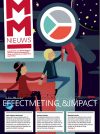As the world becomes increasingly knowledgeable and sophisticated and the challenges more ‘wicked’, social innovation grows in popularity. As our research group – KIWI Consultancy, consisting of nine students of the minor Creative Industries at the NHTV in Breda – has realised, cultural sectors are increasingly in need for innovative changes in order to survive. In a project about scenario planning, we are concentrating on innovation within the public library sector with the aim to redefine the role of libraries in society and to guarantee their relevance in the future.
Since the nineties libraries in developed
countries all over the world face a decline in
the demand for the services they offer. This
is noticed by government institutions and as
consequence the cultural budget for libraries
is cut back. But why did the public library
slowly but surely come under pressure in the
last twenty years? There are three important
aspects to understand why this could have
happened. First, the library never actively fought
against the image of a place where only highly
intelligent people put their noses into dusty old
books, whereas it should have been promoted
as a place open for everybody. Secondly, while
young children enjoy the library as much as
the older generation who still cherish printed
media, the library fails to address the needs and
wants of the generation aged between fifteen
and thirty-five years. As a consequence, many
people ‘lose contact with their library’ when they
grow up. Lastly, our society has transformed
enormously over the past two decades. The
digital information society knows everything,
everywhere and at any given time. So why waste
valuable time in visiting the library, browsing
through books or even asking a complete
stranger for advice when you can have access to
any information at a touch of your fingertips?
The international research of the Dutch
professor in Library Science Frank Huysmans
also concentrates on the societal value of the
public library. He states that the original mission,
“to provide people with information, knowledge
and culture, to enrich their lives and become
better educated”, remains like it was a hundred
years ago. However, the means through which
the mission is delivered to the public are in need
of innovation, Huysmans adds. This mission
further highlights that it is not only important
for libraries to survive, but that they have a right
to exist based on their relevance to society as a
whole.
Success stories
This complex challenge calls for an
innovative and creative out-of-the-box
approach. Scandinavian countries in particular
are already ahead in this process. The Urban
Media Space in Aarhus, Denmark, implements
an entrepreneurial strategy by providing project
rooms, study cells, the latest communication
equipment, a café, a public living room, training
rooms, small mobile workspaces, activity rooms
and open, informal spaces where anyone can
seek information, inspiration and means of
self-development. The library is supposed to
become “the city’s heart of knowledge and
culture – a permanent icon for Aarhus for up to
a thousand years”.
Some examples of successful repositioning
and restructuring can also be found in the
Netherlands. In Delft, the DOC Library Concept
Centre promotes itself as an information
community centre. The management has
implemented a shift in concept from tradition
to inspiration and creativity and included
entrepreneurial aspects to the original idea of
a public library. Smaller towns provide some
inspirational approaches and innovative ideas
as well. The Boekenberg, located in the market
square of Spijkenisse, looks like a mountain
of books, a design award winning architecture
which represents an advertisement for the
library itself and an invitation to read at the
same time. Next to this function, the library also
hosts other institutions like a chess club, an
education centre, offices and retail. This shows
a new conceptualisation of different business
aspects.
Whether a library chooses an entrepreneurial,
cultural or any other strategy to
remain relevant in society is heavily dependent
on the communities they are based in. It is
fair to say that these changes, as well as a
multi-disciplinary approach, are necessary
but whether or not they’re successful can’t
be predicted yet. Obviously, the need for new
business models in the public library sector is
inevitable. In the end, the opportunities and
ideas of the ones involved in the innovation
process will hopefully be as countless as
diverse, as to be able to eventually bring back
the public library as an institution that plays a
legitimate role in public life.
KIWI Consultancy consists of Janine
Grundentaler, Femke van Huet, Fen
van der Kruit, Paul Löbbert, Nina
Reichle, Helen Scheepers, Sarah-Marie
Schuessler, Iris Visser and Lisa Wagner,
all fourth-year students International
Leisure Management taking part in the
minor Management in Creative Industries
at NHTV’s Academy for Leisure.
